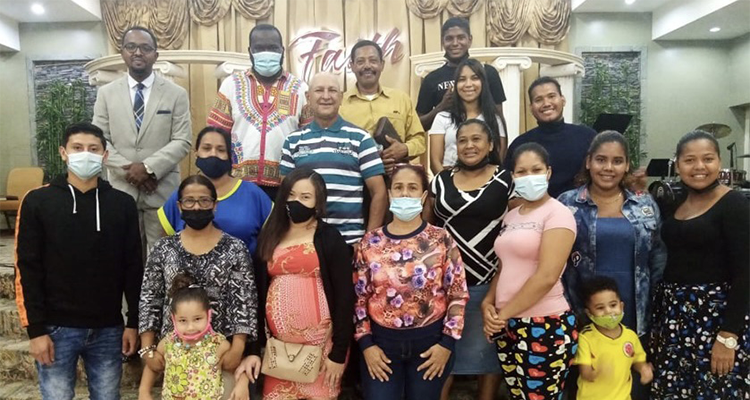
Nazarenes serve Venezuelan migrants in Trinidad and Tobago

The difference in language was not a roadblock for the Arima Church of the Nazarene in Trinidad and Tobago (English-speaking), ministering holistically to a community of Venezuelan migrants (Spanish-speaking).
After reaching out to the community and learning about their needs, church members began teaching English, providing tabletop stoves, gas tanks, and in some cases, financial aid. They shared food and arranged a physical space for a local agency to run a place that was child-friendly for a year. Additionally, the church worked hard to organize a local ministry to be able to offer worship services in Spanish.
Rian Williams, pastor of the Arima Church of the Nazarene, said the start of the ministry to migrants was challenging and took several months to establish. However, thanks to the support of District Superintendent Victor George and faithful volunteers; they kept the ministry going.
The volunteers visited the communities where the Venezuelans settled in order to invite them to classes and the English service. Many lived in less than adequate conditions, leading the team to attend to the people’s immediate physical needs as well.
According to Williams, many of the migrants who have arrived had to leave behind children, elderly parents, spouses, and homes to build a new life; even those who once had respectable professions have chosen to migrate foreseeing a better future.
Currently, a strong group of people attend Spanish worship services every Sunday, which they call "their home." In 2020, five Venezuelans officially received church membership.
"The Arima church is committed to loving and serving Venezuelan migrants, even if the needs are great." Williams said. “Upon arrival, migrants face the difficult task of finding decent and paid jobs, adequate living conditions, schools for their children and, in exceptional cases, xenophobia,” Williams said.
One mother shared with Williams her frustration at not being able to take her children to school even though they were both born in the country. Another couple said the property owner threatened to evict them after raising the rent without notice.
For Arima, the journey to start a ministry to migrants began with a class assignment. Williams was studying at Point Loma Nazarene University when he worked on a project related to Venezuelan migration in Trinidad and Tobago, which became a turning point.
Before long, Williams and his wife Alvilene sensed God’s call on them to serve this specific group. The challenge was that neither the pastor nor any church member could speak Spanish. Alvilene knew a little but not enough to teach or preach. Despite the limitations, the church pursued the idea with a plan to begin teaching English classes for Spanish speakers as well as worship services in Spanish.
“God began to raise up volunteers to help,” said Williams.
An example of this was Keron Weekes, who currently leads the ministry. He had grown up in the church but drifted away from it during his teen years. However, Pastor Williams said that Keron "coincidentally" returned to the Lord shortly before the ministry began. He also happened to have majored in Spanish at the local university and “coincidentally” was a Spanish teacher at a local school.
"The hand of God sending Keron at that time is a reminder that wherever the Lord leads...He will provide." Williams said.
Also, when the ministry began, the Lord raised up two English worship leaders, Farouk Mohammed Jr. and Nicole Brewster, to learn how to sing Spanish worship songs using clues. By the grace of God, the ministry now has native Spanish speakers on the worship team.
Pastor Williams said that God is using the church to minister to Venezuelans in their native language, which has led them to experience a sense of community and belonging. As they worship and come together, their loneliness has dissipated.
Furthermore, he expressed the faith that future generations of Venezuelans will experience God's Word and love to become Christ-like disciples.
